The Writer’s Reference and Style Guide Collection (7 vols.)
Digital Logos Edition
Overview
Writing well is a skill that comes with much practice. Exceptional authors connect with their audience in a way that appears effortless, but is based upon foundational concepts and rules that many can put into practice. With this collection, writers will learn from celebrated practitioners, editors, and lexographers who have shaped and defined modern English grammar. Set your writing apart by writing passionately, academically, to inform, to convince, or to critique. This collection of cherished reference works helps established writers, editors, and students alike write like the greats and better understand what makes them so effective.
Sharpen your ability to write and communicate theological concepts with Writing Theology Well: A Rhetoric for Theological and Biblical Writers, Second Edition.

- Directs writers in ordering their thinking before words are on a page
- Classic examples of communicating in writing
- Etymological background for dictionary entries assist writers in choosing a fitting word.
- Title: The Writer’s Reference and Style Guide Collection (7 vols.)
- Volumes: 7
- Pages: 2,625
- Resource Types: Grammar, Dictionaries
- Topic: English Grammar
Individual Titles
- Dictionary of Modern English Usage by H.W. Fowler
- The Chicago Manual of Style, 1st Edition by University of Chicago Press
- The Elements of Style by William Strunk Jr.
- How to Write Clearly: Rules and Exercises on English Composition by Edwin A. Abbott
- Stokes’ Encyclopedia of Familiar Quotations by Elford E. Treffry
- Chambers’s Etymological Dictionary of the English Language by Andrew Findlater
- Rules for Compositors and Readers at the University Press by Horace Hart
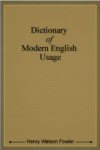
Dictionary of Modern English Usage
- Author: H.W. Fowler
- Publisher: Oxford University Press
- Publication Date: 2010
- Pages: 832
Henry Fowler’s Dictionary of Modern English Usage was highly influential during the twentieth century, providing writers with a widely recognized standard for English grammar, words, and style. His wit and personality came through so clearly in his writing, making his book a rarity among reference works: actually pleasant to read. Fowler is fondly remembered by readers as a solid arbiter of correct practice within English usage. Modern readers will benefit from his clarity and passion for language.
It is a volume that everyone who aspires to a better command of English should possess and consult.
—New York Times Book Review
H.W. Fowler (1858–1933) was a British schoolmaster whose passion for language led him to write the much-loved Dictionary of Modern English Usage. Educated at Oxford, he served as a teacher until transitioning to journalism. This led him to writing his noted works on lexicography and contributing to the Concise Oxford Dictionary.
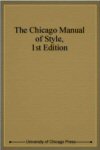
Originally published as A Manual of Style, the first edition of the Chicago Manual of Style (CMOS) heralded a new age of writing and citation standards in the US publishing industry and immediately grew into what is now the most-used style guide in the United States. The Chicago Manual of Style forms the basis for numerous field-specific style guides, including Turabian, the American Anthropological Association, and our very own Faithlife Marketing Style Guide. With the first edition in your library, you'll see the philological and conventional developments of American English since CMOS’ publication in 1906, and compare its rules against the style your writing depends on.
University of Chicago Press is a publisher of fine works since 1890, and is one of the three divisions of the University of Chicago. In addition to reference material, journals and books are also part of their rich tradition of disseminating worthwhile scholarship.
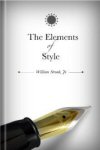
Learn to write clear and accurate prose from a master of English style—William Strunk. This little book, originally circulated amongst Strunk’s students at Cornell, has become a desktop stalwart of engineers, managers, students, pastors, and writers of every variety. Strunk’s seven rules of usage and 11 principles of composition have been creating clear communicators for almost a century.
Strunk notes in his introduction, “It is an old observation that the best writers sometimes disregard the rules of rhetoric. When they do so, however, the reader will usually find in the sentence some compensating merit, attained at the cost of the violation. Unless he is certain of doing as well, he will probably do best to follow the rules.” No one has stated a clearer or more helpful set of rules than the beloved professor Strunk in The Elements of Style.
Buy it, study it, enjoy it. It’s as timeless as a book can be in our age of volubility.
—New York Times
No book in shorter space, with fewer words, will help any writer more than this persistent little volume.
—Boston Globe
. . . Should be the daily companion of anyone who writes for a living and, for that matter, anyone who writes at all.
—Greensboro Daily News
It’s hard to imagine an engineer or a manager who doesn’t need to express himself in English prose as part of his job. It’s also hard to imagine a writer who will not be improved by a liberal application of The Elements of Style.
—Telephone Engineer & Management
William Strunk Jr. (1869–1946) was professor of English at Cornell University, where he taught for 46 years. Strunk read and instructed on a broad range of literature, and compiled critical editions of work ranging from Cynewulf, Shakespeare, Dryden, and James Fenimore Cooper. He also served as a Hollywood literary consultant for Metro-Goldwyn-Mayer. Strunk is best known though, for his “little book” of English usage, The Elements of Style, published privately for his students, which went on to be revised by E.B. White and known colloquially as “Strunk and White.”
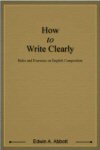
Written to help students avoid ambiguity in their writing, Abbot’s How to Write Clearly is an excellent resource for use in sacred and secular settings. Especially for those studying Latin and Greek, the ability to translate into English rather lengthy sentences is an essential skill. Rather than focusing on punctuation, this book is designed to help students arrange their thoughts in a way that promotes clarity and understanding.
Edwin Abbott Abbott (20 December 1838 – 12 October 1926), English schoolmaster and theologian, is best known as the author of the satirical novella Flatland (1884).
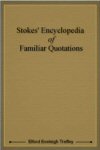
Ever have a familiar quote or maxim on your mind, but don’t know where it came from? With Stoke’s Encyclopedia, you’ll be able to search for any familiar quote and find the very page number of the book it originally appeared in. Further, these quotations are catalogued by topic, so if you’re looking for an illustration on marriage, death, or money, you’ll have an instant treasury of quotations. Who first said, “Marriages are made in Heaven”? Who said, “Absence makes the heart grow fonder”? With this encyclopedia, you’ll not only have a citation to its original instance, but if you have the source of the quote in your library, you'll have a link to the text it came from.
Elford E. Treffry was a scholar in the early twentieth century whose wide knowledge of literature, including Greek and Latin classics was put to use in compiling Stokes’ Encyclopedia of Familiar Quotations.
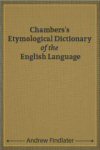
Filled with entries addressing etymology of names, places, and word usage, this dictionary provides readers with a wealth of information at their fingertips. Greek, Latin, and global language origins are referenced in each pertinent entry. Obscure or obsolete words are included in a supplementary glossary, allowing a reader to determine how language has changed over time. In addition, a helpful pronunciation chart for names found within Scripture and a list of proper names from mythology and classical sources is also included. This helpful resource will allow readers to better understand the origins of widely used English expressions, phrases, and individual words.
Andrew Findlater (1810 — 1 January 1885)was a Scottish editor who produced Information for the People, Chambers’s Encyclopaedia, and edited the Scotsman.
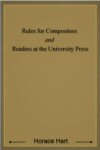
The original edition of the Oxford Manual of Style, Hart's Rules set out to standardize British spelling, typesetting, punctuation, and grammar for university publications. Eventually, this endeavor spread throughout the English-speaking publishing world, and is now one of the most authoritative writing reference manuals in the English language, taking the form of the Oxford English Dictionary, the New Oxford Style Manual, the New Hart's Rules: The Handbook of Style for Writers and Editors, and more.
Horace Henry Hart (1840–1916) was an British printer and biographer widely known for his Hart’s Rules. During his lifetime, he served as printer to the University of Oxford, controller of the university press.
Reviews
9 ratings

Daniel Presley
6/20/2021

Michael R Shotwell
7/14/2020

Gregg Watson
5/25/2020

Glenn & Dolly Walls
2/2/2020
It would appears that the other comments are from those that would like to have the newer publications, or they are more advanced and have no need for these. I am not where they are and this will be a great start. I hope that there will be more of the newer publications offered later. Thanks Logos for looking out for the little guy.
Brian K
1/12/2020
Most of these are a century old or more. Writing style and reader sensibilities have changed radically in the last 100 years. I'm scratching my head trying to figure out why Logos would even offer these. Maybe for historical research into how writing style has changed? That would be a narrow market.Patrick Danahy
11/9/2019
Mentioning that White updated Strunk does not absolve you of peddling old wine skins as new. However timeless the Kingdom, this collection is not helpful for present work. That you feature it's virtues in present tense leads me to question whether your marketing department is getting out of hand. To preach clarity with unclear copy leads me to be wary of the offer and publisher--despite the benefits of your excellent products.
Joshua Steele
10/11/2019
Give us the most recent editions of these works, and then we'll talk! These resources are out of date and rather pointless to consult at this point in one's writing workflow.Tim Wood
5/30/2019
Most are over a century old and have been updated multiple times. If you need to cite anything besides printed text, you're out of luck. Radio was brand new. TV was half a century in the future. And the first science fiction stories and thought pieces about the idea we now call the internet were farther out. Logos has a propensity to recycle free content for profit however the material should have some value for the audience. What would be useful would a set of current references. A list of styles guides to consider: * The Chicago Manual of Style * Publication Manual of the American Psychological Association * The Elements of Style (Strunk) * MLA Handbook Some possible current writing guides (e.g. "They Say / I Say": The Moves That Matter in Academic Writing, A Guide for Writing About Theology and Religion)Lynn Kauppi
4/3/2019
As a professional editor, I can unequivocally say that these style guides are useless. Their only value is purely historical.
Fr Steven G Rindahl
1/9/2019
These are so far out of date they will be use to nobody doing any writing for an academic setting today.